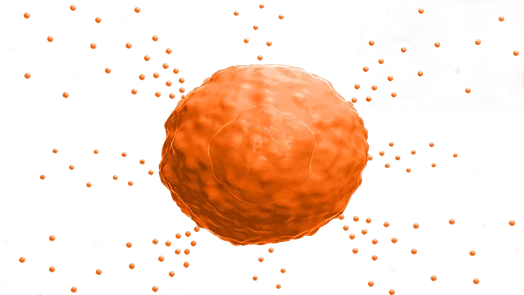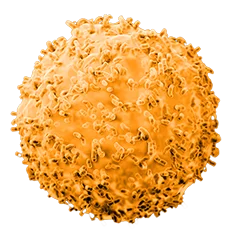Ozureprubart (formerly RPT904): A long-acting anti-IgE antibody
Ozureprubart is a novel half-life extended monoclonal antibody (mAb) designed to bind free human IgE, a key driver of allergic diseases. We plan to develop ozureprubart initially as a treatment for food allergy (FA) and chronic spontaneous urticaria (CSU) and potentially other allergic inflammatory diseases in the future.
In a first-in-human study in healthy volunteers, ozureprubart demonstrated extended pharmacokinetics (PK) and pharmacodynamic (PD) properties compared to the first generation anti-IgE mAb omalizumab. With the extended half life, ozureprubart has the potential to be dosed every 8 to 12 weeks, compared to every 2 or 4 weeks for omalizumab. Ozureprubart also has the potential to treat people with high IgE or body weight who are currently not eligible to be treated with omalizumab.
*XOLAIR® is a registered trademark of Novartis AG.
Ozureprubart is an investigational agent and is not approved by any regulatory agency as a treatment for any indication. Efficacy and safety have not been established.
NOW ENROLLING
prestIgE TRIAL INVESTIGATING OZUREPRUBART,
A LONG ACTING ANTI-IgE IN FOOD ALLERGY
IgE in food allergy
Food allergy (FA) is a significant and growing health problem in the United States, Europe and throughout the developed world. It is estimated that over 17 million people in the US have been diagnosed with an FA, including approximately six million children. Approximately 40% of people with an FA are allergic to more than one food, and approximately half of food-allergic people in the US have had a severe reaction from their food allergy.
FA occurs when the immune system responds to a harmless food as if it were a threat. In non-allergic people, tolerance for food proteins develops early in life and the immune cells do not mount a response when food proteins are detected. In an allergic person, the immune system is sensitized to one or more food proteins, or allergens (“sensitization” phase).
As a result of this sensitization, the person’s immune system produces IgE antibodies, which are directed against that particular allergen. The IgE antibodies bind to mast cells and basophils via a receptor called FceR1. When an IgE antibody bound to these immune cells encounters the allergen it is directed against, the mast cells and basophils are activated and release histamine and other inflammatory mediators, which then provoke the symptoms of an allergic reaction (“effector” phase). Symptoms may include hives, swelling, vomiting, abdominal pain, wheezing, breathlessness, and lowered blood pressure.
Allergic reactions can be triggered by exposure to minute quantities of the relevant food allergen and can be painful, frightening, and potentially deadly. In some cases, severe reactions known as anaphylaxis can occur, which can lead to death. Such reactions require urgent medical attention and often result in treatment at hospital emergency departments.
IgE in CSU
Chronic spontaneous urticaria (CSU) is a serious skin condition defined by the appearance of itchy red welts, known as hives, and often deeper tissue swelling (angioedema) that persists for at least six weeks and frequently much longer, without any identifiable external trigger. CSU affects roughly 0.5%–1% of the population, striking most commonly between ages 20 and 40, with women impacted twice as often as men.1 For the people affected, the unpredictable, persistent nature of CSU can be devastating. Hives and swelling may appear anywhere on the body, often interfering with sleep, social relationships, and daily activities, while the itching and discomfort can lead to exhaustion, pain, and anxiety.2 The burden extends beyond physical discomfort—many people experience depression, impaired work productivity, and significant social withdrawal. More than 20% of those with CSU miss at least an hour of work each week.
CSU is driven by complex immune system dysregulation.3 The condition involves abnormal activation of immune cells such as mast cells and basophils, which spontaneously release histamine and other inflammatory mediators into the skin without external provocation, leading to the characteristic hives and swelling, as well as chronic inflammation and symptom persistence.
Despite the availability of antihistamines, many patients remain inadequately controlled, cycling through medication regimens with only partial or temporary relief. This persistent gap between therapeutic goals and outcomes highlights an unmet medical need. More effective, lasting, and accessible treatments are needed that target the underlying immune mechanisms of CSU and restore well-being.
In a Phase 2 trial in 137 people with CSU refractory to antihistamines, a single dose of ozureprubart showed durable efficacy out to 16 weeks that was comparable to omalizumab dosed every 4 weeks. Ozureprubart was well tolerated with no drug related serious adverse events.




